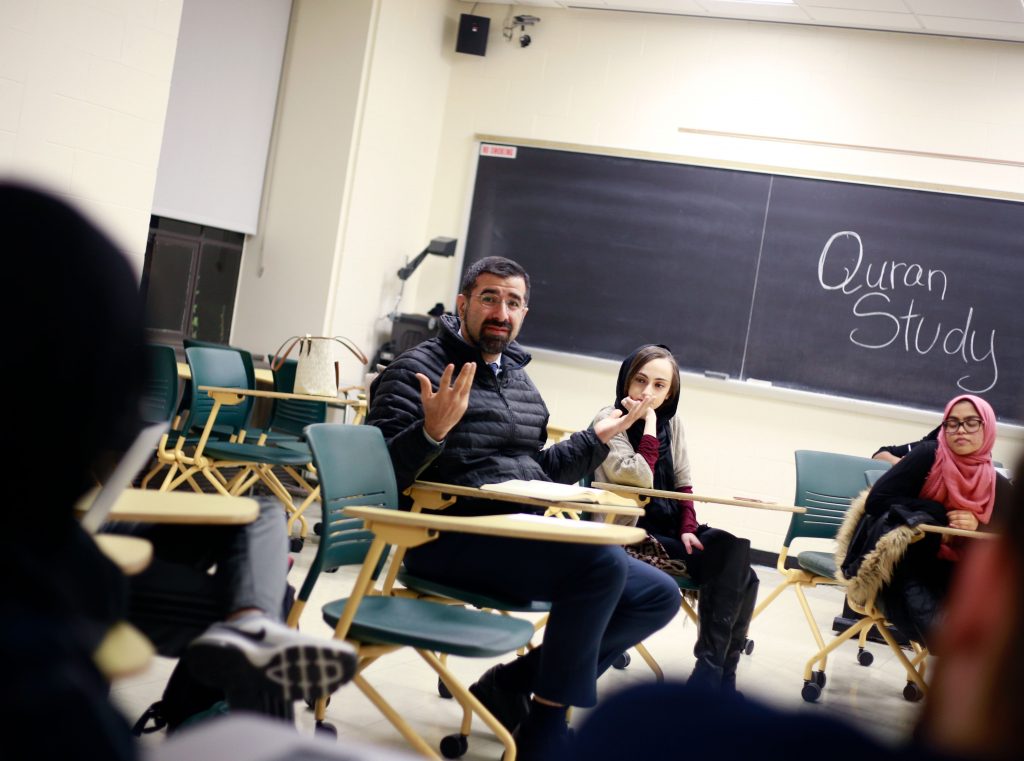
On a Friday at 5 p.m., most students are gathering in the dining halls around campus to grab a bite to eat before heading out for late-night activities. In a room in the Fine Arts Building, though, several students take time each week to study the Quran.
The sessions, part of a Quran study series dedicated to fostering a deeper understanding of the religion, are held by the Binghamton University Muslim Student Association (MSA), a multicultural student group founded in 1992. According to Hira Qayyum, president of the MSA and a senior double-majoring in classical and Near Eastern studies and business administration, the series is one of many events the organization holds to spread knowledge, build awareness and dispel misconceptions about Islam.
In addition to the study sessions, the MSA also hosts community-service events, lectures, trips and special events for Islamic holidays such as Ramadan. The group invites guest speakers to their Quran study series and holds a banquet every semester. Occasionally, the organization teams up with other multicultural and religious groups on campus to plan volunteer events.
“After break, we are pairing up with Hillel for a charity and volunteering event, which involves making blankets for the homeless,” Qayyum said. “We love doing interfaith community service events, since it shows different faiths coming together to serve one purpose, to help those in need.”
The organization also aims to serve as a support group to Muslims at BU and is the major artery for Muslim students seeking to practice their faith in college. In addition to holding meetings and other events, the MSA maintains a prayer room in University Union West Room 308, which is always unlocked. According to Qayyum, the group has recently begun to focus on providing more support services for Muslim students.
“One of the MSA goals is to always be there for its members and any Muslim on campus,” Qayyum said. “Within the last two years, we have definitely been focusing on this more due to the current political situation and the various obstacles that Islam is now facing.”
Additionally, the MSA helps students questioning their religion or considering converting to Islam, and educates them on the religion and its customs. The group also works with local mosques to provide places for students to turn for guidance and prayer.
“In the past we have also had many students who found themselves walking along the path of Islam and feeling ready to convert to the religion,” Qayyum said. “Thus, we welcome them and personally invite them to our meetings with open arms, and always willing to set aside time to help them understand the religion more.”
Omid Ghaemmaghami, an assistant professor of Arabic, is one of the many guest speakers whom the MSA has invited to its Quran study sessions. Ghaemmaghami said he isn’t Muslim but has studied Islam extensively and hopes these discussions on the Quran help overcome common misconceptions about Islam.
“One of the things that we could’ve continued to highlight in these sessions we have is that Islam and Christianity share the same spiritual heritage according to a Muslim understanding,” Omid said. “The Quran has stories of many of the prophets that are found both in the Old Testament and the New Testament.”
Shamsudeen Gimala, a senior majoring in business administration, attended the Quran study session. He said he was encouraged by the attendance of both non-Muslim and Muslim students in studying the text.
“It was very enlightening and the explanations were more in-depth than what I expected it to be,” Gimala said. “I love how this is an opportunity for both Muslims and non-Muslims to learn more about the religion when there are so many misconceptions about Islam today.”


